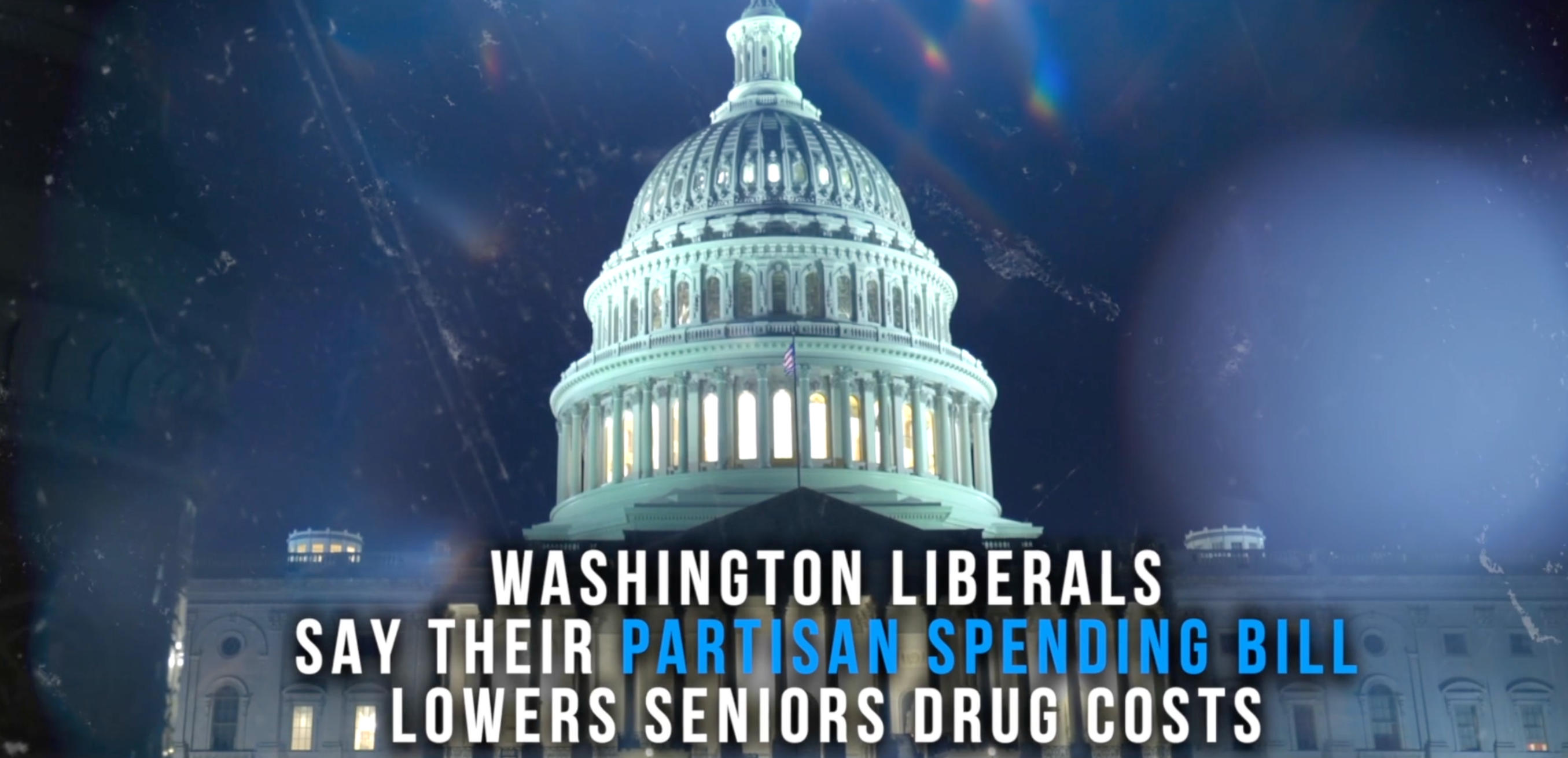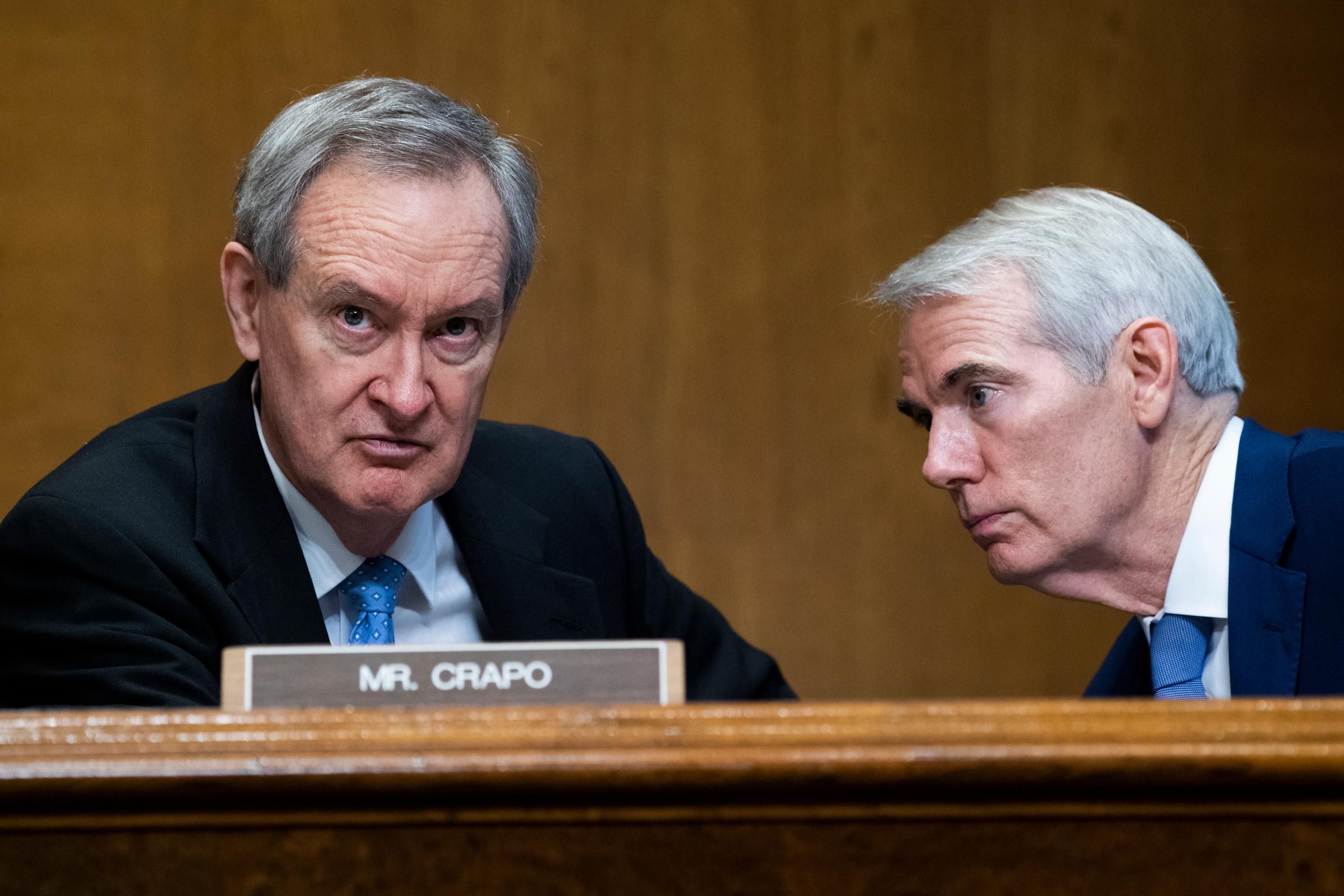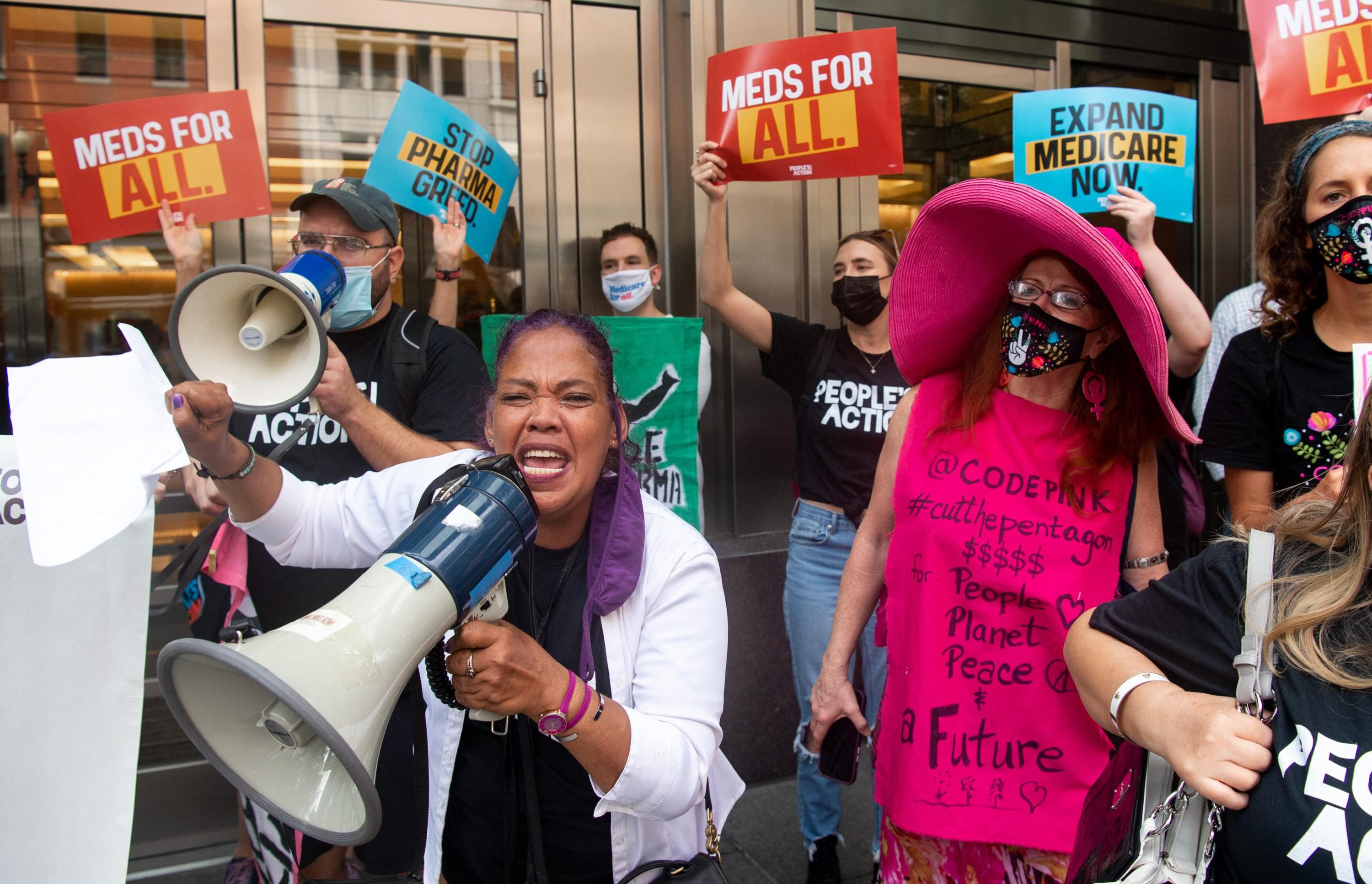"Powerful interest groups out there don't want this legislation to succeed, so they're pouring dark money into efforts to stop it," said one Democratic senator.

The group American Commitment is running ads in several states attacking Democrats' plan to lower prescription drug prices. (Photo: Screengrab/American Commitment)
JAKE JOHNSON
While its thousands of lobbyists work fervently on Capitol Hill, the pharmaceutical industry is flooding the airwaves in several states with deceptive ads in a last-ditch campaign to block Senate Democrats' plan to curb the unchecked pricing power of drug corporations.
Included as part of a reconciliation package negotiated by Sen. Joe Manchin (D-W.Va.) and Senate Majority Leader Chuck Schumer (D-N.Y.), the proposal would require Medicare to negotiate the prices of a small number of drugs directly with pharmaceutical companies, which can currently drive up costs as they please—boosting their profits at the expense of patients.
"We aim to pass reforms to lower Rx prices in the coming days and curb pharma's power to dictate prices to Americans. Let's see it through."
The measure would also cap out-of-pocket medicine costs at $2,000 a year for recipients of Medicare Part D, the prescription drug benefit provided through private plans approved by the federal government.
The drug industry—which has repeatedly fought off price regulation attempts in recent decades—has lashed out furiously against Democrats' plan, even though it is in some ways significantly weaker than a proposal that the House passed last year. Republicans bankrolled by Big Pharma are also working to tank the bill.
Roll Call reported Friday that the "Pharmaceutical Research and Manufacturers of America (PhRMA), the National Association of Manufacturers, and a group called American Commitment have collectively spent millions of dollars on ads in July" to attack Democrats' proposal, key parts of which are overwhelmingly popular with the American public.
"We're going to use every tool in the toolbox to relentlessly educate lawmakers about the flaws in this bill," declared Stephen Ubl, president of PhRMA, the nation's leading drug industry trade group.
American Commitment, a nonprofit with ties to the Koch Brothers, launched a new seven-figure ad buy on Thursday, targeting audiences in Washington, D.C. as well as West Virginia, Nevada, and Georgia.
The ads, which can be viewed in full on American Commitment's website, recycle the false and repeatedly debunked claim that Democrats' bill would cut "nearly $300 billion from Medicare," distorting the Congressional Budget Office's estimate that the legislation would save the federal government roughly $290 billion over ten years.
The American Prosperity Alliance, a dark money group, is running similarly misleading ads.
Sen. Catherine Cortez Masto (D-Nev.) responded directly to the ads—one of which attacks her directly—in a speech on the Senate floor earlier this week, noting that the 30-second spots led hundreds of constituents to call her office seeking an explanation.
"They were anxious and alarmed over a deliberately misleading ad that is running on TV, on Facebook, and via a text campaign," said Cortez Masto. "In Reno this past weekend, Nevadans came up to me because they were concerned about these false accusations. This ad incorrectly claims that I support a bill that would strip $300 billion dollars from Medicare. This couldn't be further from the truth."
"Powerful interest groups out there don't want this legislation to succeed, so they're pouring dark money into efforts to stop it," the senator continued. "Well, let me just say this: it won't work."
In an analysis of Democrats' proposal published Wednesday, the Kaiser Family Foundation (KFF) concluded that the bill has the potential to "limit annual increases in drug prices for people with Medicare and private insurance" and "provide substantial financial protection to people on Medicare with high out-of-pocket costs."
The precise impact of the legislation, KFF stressed, will depend on which prescription drugs Medicare chooses to negotiate. A separate KFF analysis released last year found that a small number of drugs make up a major share of Medicare's prescription drug spending.
"We are inches from the goal line," David Mitchell, the founder of Patients for Affordable Drugs, tweeted Friday. "We aim to pass reforms to lower Rx prices in the coming days and curb pharma's power to dictate prices to Americans. Let's see it through."
Our work is licensed under Creative Commons (CC BY-NC-ND 3.0). Feel free to republish and share widely.
"Republicans are going to use every tool they have to keep drug prices high and drug industry profits higher," said one Democratic senator.

Sen. Mike Crapo (R-Idaho) talks with Sen. Rob Portman (R-Ohio) during a hearing
JAKE JOHNSON
Republican lawmakers are working behind closed doors to convince the Senate parliamentarian—the chamber's unelected rules arbiter—to tank Democrats' watered-down but still potentially impactful proposal to require Medicare to negotiate the prices of a small number of prescription drugs directly with pharmaceutical companies.
Sen. Mike Crapo (R-Idaho), a major beneficiary of pharmaceutical industry campaign cash, admitted as much in remarks to reporters on Tuesday, saying that he and his GOP colleagues are "going through line by line, literally, making objections" in private meetings with the Senate parliamentarian, who is tasked with offering advice on whether reconciliation provisions comply with chamber rules.
"Folks in Idaho need to know he's not working for them—he's working for Big Pharma."
Under the Senate's Byrd Rule, every provision of a reconciliation package must have a direct, not "merely incidental," impact on the federal budget. Democrats contend their Medicare proposal meets that requirement, citing the Congressional Budget Office's recent estimate that the plan would save the federal government $290 billion over 10 years.
But Crapo insisted Tuesday that "there are many Byrd objections," and Politico reported that Democrats are currently "making tweaks" to the legislation to ensure it survives the parliamentarian's scrutiny—even though the official's opinions are nonbinding and can be overruled.
"Republicans are working hand in hand with Big Pharma to try to block Democrats from lowering drug prices," warned Social Security Works, a progressive advocacy group.
The GOP's efforts come as the pharmaceutical industry is mobilizing its huge army of Capitol Hill lobbyists in a last-ditch campaign to defeat Democrats' plan, which would require Medicare to directly negotiate the prices of a subset of prescription drugs—an idea that is overwhelmingly popular with the U.S. public.
While Democrats' proposal has faced criticism from progressive lawmakers who say it doesn't do enough to challenge the pharmaceutical industry's power to drive up costs, advocates and experts say the bill could still have a significant effect on prices for seniors and people with disabilities, given that a small number of medicines account for a major portion of Medicare's prescription drug spending.
"Sen. Mike Crapo is proud that he's trying to gut legislation to lower drug prices supported by more than 70% of Americans," said David Mitchell, the founder of Patients for Affordable Drugs. "Legislation to improve health and save Americans money. Folks in Idaho need to know he's not working for them—he's working for Big Pharma."
Related Content
Senate Majority Leader Chuck Schumer (D-N.Y.) is aiming to get the Medicare proposal as well as a plan to extend Affordable Care Act subsidies through the chamber before the August recess, which is set to begin next week.
In the face of unanimous Republican opposition, Democrats will need the support of all fifty senators in their caucus to pass the reconciliation package, which is exempt from the 60-vote filibuster.
"Republicans are going to use every tool they have to keep drug prices high and drug industry profits higher," Sen. Chris Murphy (D-Conn.) warned Tuesday.
Sen. Brian Schatz (D-Hawaii) added that "every single elected Republican in the Senate is about to vote against reducing the cost of prescription drugs for those on Medicare."
"This is not a show vote or a symbolic thing—we are going to make a new law," Schatz wrote. "It will save seniors thousands of dollars a year."
Our work is licensed under Creative Commons (CC BY-NC-ND 3.0). Feel free to republish and share widely.
‘Is it better than nothing? I suppose’: Sanders disappointed by Dems’ drug pricing plan
"It's a very weak proposal" but "we're dealing with the power of PhRMA over the Congress," he said, taking aim at industry lobbyists.
Senate Budget Committee Chair Bernie Sanders on Tuesday blasted Democrats’ watered-down drug pricing plan and suggested pharmaceutical industry lobbying weakened the proposal.
“It goes nowhere near as far as it should.”
“It’s a very weak proposal. It goes nowhere near as far as it should,” Sanders (I-Vt.) told NBC News‘ Sahil Kapur.
The deal unveiled earlier this month would enable Medicare to negotiate the prices of a limited number of prescription drugs. Other provisions include creating a $2,000 out-of-pocket cap for Medicare Part D beneficiaries, stopping brand-name manufacturers from blocking generic options, and penalizing companies that raise prices faster than inflation.
The plan is notably backed by Sen. Joe Manchin (D-W.Va.)—who last year blocked a House-approved budget reconciliation package and said this month that he wouldn’t support new climate spending or tax hikes on the rich and large corporations.
Sanders, who pushed for a sweeping package last year and has long been a leading Medicare for All advocate, pointed to the U.S. Department of Veterans Affairs (VA) as a model for drug price negotiation.
“The American people want Medicare to negotiate prescription drug prices like the VA does,” the senator said Tuesday, according to The Hill.
“The VA has been doing that for decades. The prices they pay are about half as much as Medicare. This thing will only apply to a certain number of drugs,” Sanders continued, noting that parts of the proposal would not take effect until 2026.
“So it’s a weak proposal. Is it better than nothing? I suppose,” he added of Democrats’ plan.
Sanders also took aim at industry lobbying, specifically calling out the trade group Pharmaceutical Research and Manufacturers of America (PhRMA). As he put it: “We’re dealing with the power of PhRMA over the Congress. They don’t lose very often.”
As Common Dreams reported last week, Big Pharma is mobilizing an army of lobbyists to tank Democrats’ drug reform plan while hiking the price of prescription medications.
“Pharma is spending millions to defeat a very modest drug pricing bill,” Sanders tweeted Friday. “Joe Manchin, who is blocking climate action, is the major recipient of fossil fuel campaign contributions. This is how a corrupt political system works.”


No comments:
Post a Comment